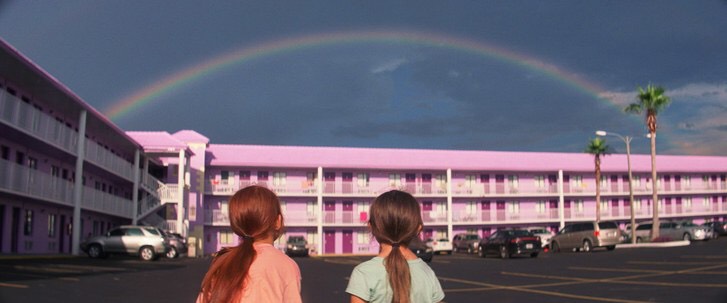
The film portrays the power of poverty to infiltrate even the strongest of childhood imaginations.
Cara Buckley, in their article on the “The Florida Project” for the New York Times (NYT) uses the inappropriate adjective “vituperative”–it means bitter and abusive–for one of the main characters, a mother named Halley played by Bria Vinaite. This word choice exemplifies exactly the classist mindset that propagates the structural violence that places Halley in her precarious situation in the first place.
Halley is a young, single mother living week-to-week in a sordid, incredibly purple, motel ironically named the “Magic Castle” with her six-year-old daughter, Moonie. The motel is situated on the outskirts of Orlando. Disneyland’s presence looms over the on-screen action from the name of the motel to the fireworks in the background of a birthday scene.
It’s summertime and Moonie gets into all kinds of trouble while the adult world goes on around her. The camera follows Moonie through her world.
“We wanted to really see the story through the eyes of children,” Alexis Zabe, the film’s cinematographer, said in an interview with GoldDerby.com. The camera was mostly kept at a low angle to capture a child’s viewpoint. Heads of adults are sometimes too tall for the frame and all one can see is their torsos and legs. Moonie’s perspective of what is happening on screen is vastly separate from that of the adults around her.
Moonie’s carefree attitude is rightly juxtaposed with the solemn adults around her. The mother, on the other hand, is usually as jubilant as Moonie. Though she is recently out of work and struggling to pay the bills, whenever she interacts with Moonie she is carefree, loving and understanding. What that word fails to take into account is the interactions between Moonie and Halley, the struggle of supporting financially and taking care of a family.
The film portrays the power of poverty to infiltrate even the strongest of childhood imaginations.
This is not Baker’s first film. A previous one, “Tangerine,” is a lighthearted comedy that follows a day in the lives of two black trans sex workers, Sin-Dee and her best friend Alexandra. Baker is interested in the ways film can heighten awareness of the fringes of society. He wants his films to undue the erasure done by big production U.S. cinema of the multitudes of identity present in the U.S.
“If more stories are told about marginalized communities, subcultures and minorities, the less marginalized they will be,” he wrote to Film Maker Magazine in an e-mail following an interview with Matt Prigge.
One may be surprised that Baker is a middle-class white man after only hearing about his most popular two films, films which have female main characters who live below the poverty line involved in sex work. As a director, Baker realized he had to navigate his privilege if he wanted to work with the topics he felt were important to explore.
“I was heading down a road where I felt that if I was going to continue to explore worlds that I wasn’t a part of—that doing it too much in an observational manner or too much from a witnessing-from-a-distance thing—I was becoming condescending towards its characters and the world that we were focused on,” he said in an interview with Vulture.com.
It’s important work to be doing, especially in a cinematic climate of throw away media. In a world where media giants like Netflix.com invest over $7 billion to mass produce content, the aim for entertainment is too often masturbatory of problematic conventions.
So far “The Florida Project” has won Hamburg Film Festival’s Film Critic Award and the International Antalya Film Festival’s Jury Special Award.
The film’s Critic’s Consensus on Rotten Tomatoes said, “‘The Florida Project’ offers a colorfully empathetic look at an underrepresented part of the population that proves absorbing even as it raises sobering questions about modern America.”
Information gathered from huffingtonpost.com, ntimes.com and fimmakermagazine.com

